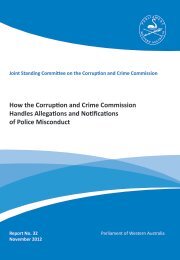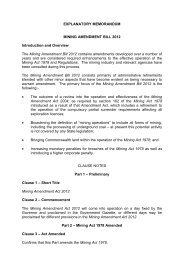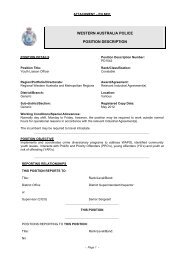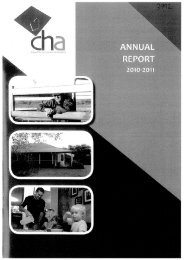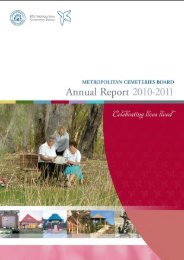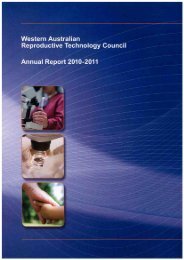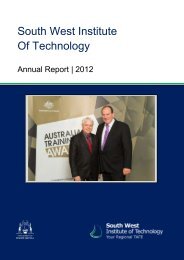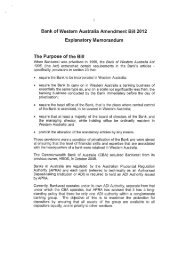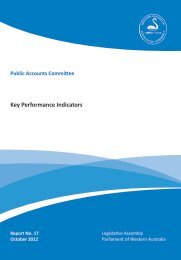law reform (contributory negligence and tortfeasors' contribution)
law reform (contributory negligence and tortfeasors' contribution)
law reform (contributory negligence and tortfeasors' contribution)
Create successful ePaper yourself
Turn your PDF publications into a flip-book with our unique Google optimized e-Paper software.
LAW REFORM (CONTRIBUTORY NEGLIGENCE AND TORTFEASORS’<br />
CONTRIBUTION) AMENDMENT BILL 2001<br />
EXPLANATORY MEMORANDUM<br />
LAW REFORM (CONTRIBUTORY NEGLIGENCE AND TORTFEASORS’<br />
CONTRIBUTION) AMENDMENT BILL 2001<br />
Explanatory note<br />
Overview of Bill<br />
The object of this Bill is to amend the Law Reform (Contributory Negligence <strong>and</strong><br />
Tortfeasors’ Contribution) Act 1947 (WA) so as to provide that in certain circumstances<br />
the damages recoverable by a person who sues for breach of a contractual duty of care are<br />
to be reduced to the extent of any <strong>contributory</strong> <strong>negligence</strong> by the person.<br />
Background<br />
At common <strong>law</strong>, a defendant being sued for a tort could generally raise the <strong>contributory</strong><br />
<strong>negligence</strong> of the plaintiff as a complete defence to the claim. That is, if the damage<br />
suffered by the plaintiff was partly due to the plaintiff's failure to take reasonable care,<br />
the plaintiff could not recover any damages at all from the defendant. (For example, a<br />
pedestrian injured by a speeding vehicle would not be able to claim damages if the<br />
pedestrian had contributed to the accident by failing to keep a proper lookout for<br />
vehicles.)<br />
The Law Reform (Contributory Negligence <strong>and</strong> Tortfeasors’ Contribution) Act 1947<br />
(WA) modified the common <strong>law</strong> by providing for apportionment of damages in cases of<br />
<strong>contributory</strong> <strong>negligence</strong>. Under the Act, if a plaintiff's damage is the result partly of the<br />
plaintiff's fault <strong>and</strong> partly of the fault of the defendant, the plaintiff can still recover<br />
damages from the defendant but the amount of damages is reduced to the extent that the<br />
court thinks just <strong>and</strong> equitable having regard to the plaintiff's share in the responsibility<br />
for the damage.<br />
The apportionment provisions contained in the Act were based on United Kingdom<br />
legislation. There are similar provisions in the other Australian States <strong>and</strong> Territories.<br />
The apportionment provisions apply to claims of <strong>negligence</strong> <strong>and</strong> other claims in tort<br />
where <strong>contributory</strong> <strong>negligence</strong> could be a defence to the claim.<br />
Some contracts contain an express or implied term that one of the parties has a duty to act<br />
with reasonable care. If that duty is breached, in some circumstances the other party may<br />
be able to sue for breach of duty of care both in tort <strong>and</strong> in contract. There was support in<br />
some Australian <strong>and</strong> United Kingdom cases for the view that the apportionment<br />
legislation extended to claims in contract for damages for breach of a contractual duty of<br />
care, where the duty of care owed by the defendant is the same in contract as in tort.<br />
LAW REFORM (CONTRIBUTORY NEGLIGENCE AND TORTFEASORS’<br />
CONTRIBUTION) AMENDMENT BILL 2001<br />
PAGE 1 OF 2
LAW REFORM (CONTRIBUTORY NEGLIGENCE AND TORTFEASORS’<br />
CONTRIBUTION) AMENDMENT BILL 2001<br />
EXPLANATORY MEMORANDUM<br />
Recently the High Court of Australia decided in Astley v Austrust Limited (1999) 197<br />
CLR 1 that the apportionment provisions contained in the Wrongs Act 1936 of South<br />
Australia applied only to claims for damages in tort; they did not apply to claims of<br />
breach of contractual duty of care. As a result, if a plaintiff sues a defendant for breach<br />
of duty of care in both contract <strong>and</strong> in tort, the plaintiff's damages may be reduced for<br />
<strong>contributory</strong> <strong>negligence</strong> in the claim in tort, but not in the claim in contract.<br />
The object of this Bill is to overcome the effect of the decision in Astley. The Bill<br />
amends the apportionment provisions in the Act so as to extend those provisions to<br />
claims for a breach of a contractual duty of care that is concurrent <strong>and</strong> co-extensive with<br />
a tortious duty of care.<br />
The amendments have a retrospective effect (that is, they apply to acts or omissions that<br />
occurred before the amendments commence). However, the amendments will not apply<br />
to acts or omissions about which a court has given a judgment, or about which the parties<br />
have agreed to a settlement.<br />
Outline of provisions<br />
Clause 1 sets out the short title of the proposed Act.<br />
Clause 2 provides for the commencement of the proposed Act on a day on which it<br />
receives Assent.<br />
Clause 3 is a formal provision providing that the amendments made by the Bill are to the<br />
Law Reform (Contributory Negligence <strong>and</strong> Tortfeasors’ Contribution) Act 1947 (WA).<br />
Clause 4 Is the key provision providing that references to claims for damages founded on<br />
<strong>negligence</strong> includes a reference to a claim founded on or resulting from a breach of a<br />
contractual duty of care that is concurrent with <strong>and</strong> coextensive with a duty of care in<br />
tort. The effect is that for the purposes of sections 4 <strong>and</strong> 6 of the Act that <strong>contributory</strong><br />
<strong>negligence</strong> will apply to cases of breach of contractual duty.<br />
Clause 5 provides that the amendment made may have a retrospective effect <strong>and</strong> apply to<br />
acts or omissions that occurred before the amendment commence. However, the<br />
amendments will not apply to acts or omissions about which a court has given a<br />
judgment, or about which the parties have agreed to a settlement.<br />
LAW REFORM (CONTRIBUTORY NEGLIGENCE AND TORTFEASORS’<br />
CONTRIBUTION) AMENDMENT BILL 2001<br />
PAGE 2 OF 2



